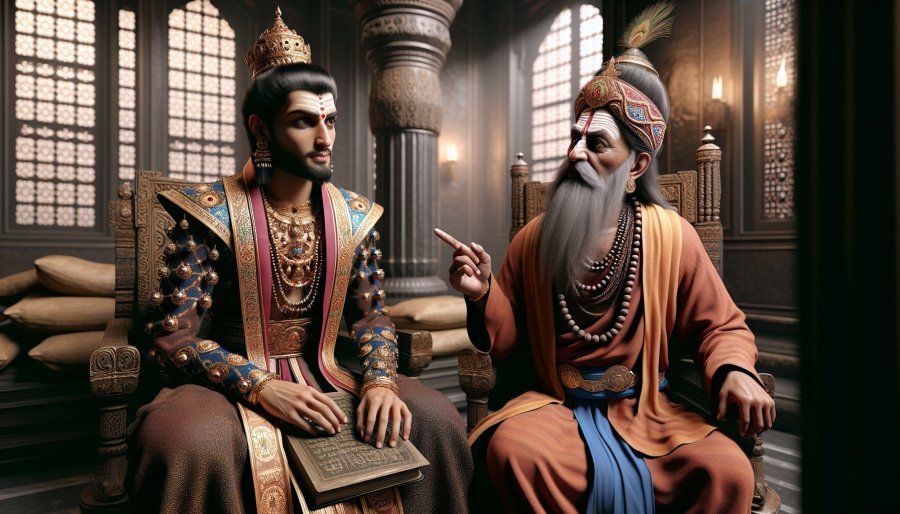Section CXXVII - King Somaka's Quest for Sons: Sacrifice for a Century of Heirs
Book index: Mahabharata (English)
This page contains a summary of the Mahabharata Section CXXVII including examples of moral lessons in daily life. The Maha-Bharata is one of the largest epics ever written containing roughly 100,000 Sanskrit verses. It deals with the legendary history of ancient India and contains a large number of interwoven tales.

Short summary of the chapter:
King Somaka, who had one hundred wives but no sons, finally had a son named Jantu after a long wait. When Jantu was stung by an ant, the mothers were distressed, and the king rushed to comfort his son. Somaka expressed his desire for more sons and asked his family priest for a solution. The priest suggested a sacrificial ceremony in which Jantu would be sacrificed, guaranteeing the birth of a century of sons for the king. Somaka agreed to perform the ceremony, hoping to have more heirs.
Upon learning about the sacrifice, Somaka realized the gravity of the decision but was willing to go through with it for the sake of having more sons. The family priest explained the details of the ceremony, assuring the king that it would result in the birth of many valiant sons for him. The sacrifice of Jantu would lead to the mothers giving birth to numerous children after taking a smell of the sacrifice's smoke. Additionally, Jantu himself would be reborn as a son with a golden mark on his back, ensuring his continued presence in the king's life.
Somaka, despite his initial hesitation, was prepared to make the sacrifice of his only son in the hopes of having a large family. The promise of a century of sons seemed to outweigh the sorrow of losing Jantu in the sacrificial ritual. The king's desire for more progeny and the belief in the power of the ceremony drove him to make a difficult decision, showing his commitment to securing a strong lineage for his kingdom. The story highlights the lengths to which individuals may go to fulfill their desires, even if it means making significant sacrifices.
Full English translation:
This page is merely a summary which is automatically generated. If you are looking for authentic sources such as the Sanskrit text or the Full English translation of Mahabharata Section CXXVII - King Somaka's Quest for Sons: Sacrifice for a Century of Heirs, have a look at the following articles:
Section CXXVII, online text
English translation by Kisari Mohan Ganguli.
Read this and other chapters online.
Mahabharata (English Summary)
by Kisari Mohan Ganguli | 31,635 words | ISBN-10: 8121505933
Buy the latest edition:
FAQ of Mahabharata, Section CXXVII:
Was King Somaka able to have children despite his initial struggles?
Yes, King Somaka was able to have a hundred sons through a sacrificial ceremony involving his son Jantu.
What was the ceremony suggested by the family priest to King Somaka?
The family priest suggested sacrificing King Somaka's son, Jantu, in a ceremony to bring forth a century of sons.
Daily life: King Somaka's Quest for Sons: Sacrifice for a Century of Heirs:
The story of King Somaka and the quest for multiple sons encapsulates a profound lesson about the lengths to which individuals may go to fulfill their desires, sometimes contemplating actions against their moral compass. In daily life, this narrative can inspire a reflection on the importance of accepting circumstances that cannot be changed and recognizing the value of what we already possess. Instead of focusing exclusively on what we lack or desire fervently, the tale encourages seeking contentment and gratitude for the present blessings. It suggests that in the pursuit of our goals, we must weigh the moral and ethical implications of our choices. The story also highlights the significance of consulting wise counsel before taking drastic measures to achieve our aims; however, it's crucial to ensure that the advice aligns with ethical values. Ultimately, it teaches that the pursuit of our desires should not come at the expense of our core values and the well-being of others.
